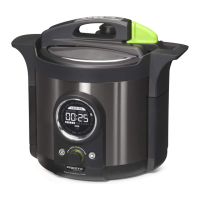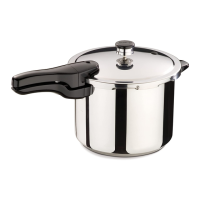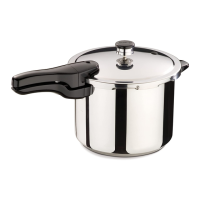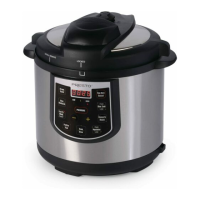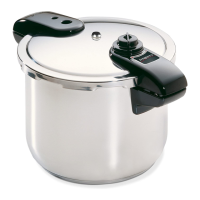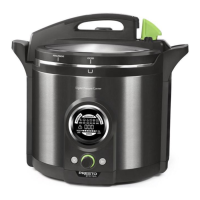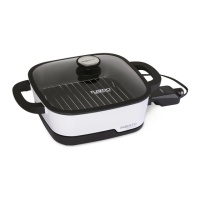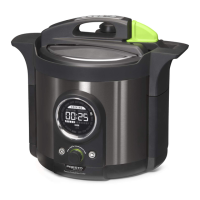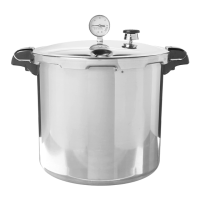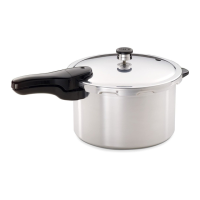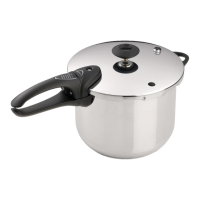11
PRESSURE CANNING Vegetables
Pressure canning is the only safe method for canning vegetables.
Young, tender, fresh, and slightly immature vegetables are better for canning than those which are overripe. As a rule, vegetables are
best when canned immediately after picking, since avor decreases upon standing and often unpleasant color changes take place.
Avoid bruising vegetables because spoilage organisms grow more rapidly on bruised vegetables than on those that are unblemished.
Wash and prepare garden fresh vegetables as you would for cooking. When packing vegetables, always leave 1-inch headspace (or
more if directed in recipe) in hot Mason jars.
To hot pack vegetables, precook in boiling water until heated through. Pack precooked vegetables into hot jars and cover with boiling
water. Whenever possible, the precooking water should be used as liquid to cover the vegetables after packing into jars. However,
there are a few vegetables, such as greens and asparagus, which make the cooking water bitter and undesirable to use.
To raw pack vegetables, simply place the prepared vegetables into hot jars and cover with boiling water.
Salt
Vegetables may be processed with or without salt. Salt is used only for avor, as it is not used in a large enough quantity to prevent
spoilage. If salt is desired, use only canning or pickling salt. Table salt contains anti-caking agents that may cause cloudiness in the
liquid inside the jars.
The recommended amount of salt is ½ teaspoon for each pint jar, 1 teaspoon for each quart jar.
CANNING RECIPES: VEGETABLES
ASPARAGUS
Wash and drain asparagus. Remove tough ends and scales. Rinse. Leave asparagus whole or cut into pieces.
Hot Pack: Cover asparagus with boiling water and boil 2 to 3 minutes. Pack hot asparagus loosely in hot jars, leaving 1-inch
headspace.
Raw Pack: Pack raw asparagus tightly in hot jars, leaving 1-inch headspace.
Add salt, if desired (see above). Cover with boiling water, leaving 1-inch headspace. Remove air bubbles. Clean jar rims. Position lids
and secure with bands.
Pressure canning: Process pints 30 minutes and quarts 40 minutes.
BEANS OR PEAS—DRY
Sort out and discard any discolored beans. Rehydrate beans or peas using one of the following methods:
● Place dry beans or peas in a large pot and cover with water. Soak 12 to 18 hours in a cool place. Then drain.
● Cover beans with boiling water in a large pot. Boil 2 minutes, remove from heat, and soak 1 hour. Then drain.
Hot Pack: Cover beans soaked by either method with fresh water and boil 30 minutes. Add salt to hot jars, if desired (see above).
Fill jars with beans or peas and cooking water, leaving 1-inch headspace. Remove air bubbles. Clean jar rims. Position
lids and secure with bands.
Pressure canning: Process pints 75 minutes and quarts 90 minutes.
BEANS—FRESH LIMA
Shell and wash young, tender beans thoroughly.
Hot Pack: Cover beans with boiling water and bring to a boil. Boil 3 minutes. Pack hot beans loosely in hot jars, leaving 1-inch
headspace.
Raw Pack: Pack raw lima beans loosely in hot jars, leaving 1-inch headspace in pint jars. For quarts, leave 1½-inch headspace if
beans are small and 1¼-inch headspace if beans are large.
Add salt, if desired (see above). Cover with boiling water, leaving 1-inch headspace. Remove air bubbles. Clean jar rims. Position lids
and secure with bands.
Pressure canning: Process pints 40 minutes and quarts 50 minutes.
